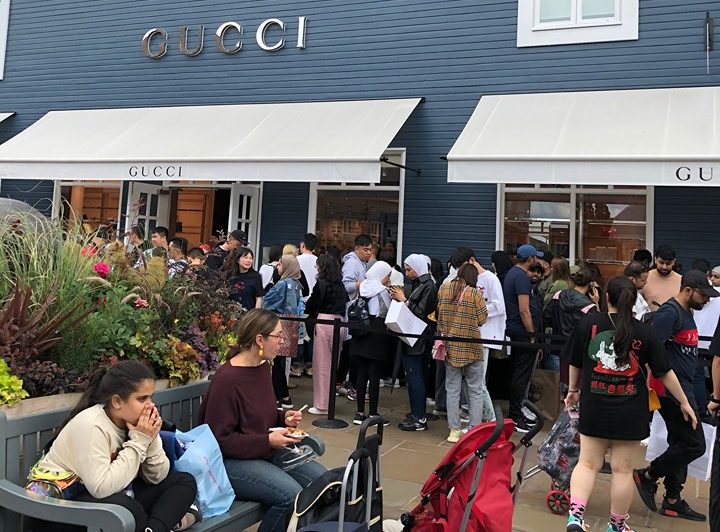With Britain predicted to hit a recession, how will the average person’s wardrobe be affected post-Brexit?
He walks with swagger to his accommodation’s terrace each day and goes around making people his fans by making them listen to his rap music on Itunes. Tamunodokubo Whyte is a student at Cardiff University. He also goes by the name of Josh. Usually seen wearing black clothes he sometimes surprises by wearing clothes of different ethnicities or unique things. When it comes to fashion, it is all about the vibe for him.
He makes new friends in seconds and can discuss anything under the sun with them. The topic of what will happen to the fashion industry after Brexit occurs fascinates him and makes him think of many different outcomes in which styles would change. “If everyone is kinda like oozing in the emotion of Brexit. It just shows that a lot of people that are invested in like the future and politics, they end up just being affected by like the environment, like the energy being given off, and that’s how I think it will affect fashion,” says Josh. “You know, the trend in the air is what goes out and people try to express themselves through the clothes they wear. And it’s quite interesting, I think graphic t-shirts will be all the rage now once Brexit is on.”
While Josh was able to spot an upcoming trend in the situation, he worries about Brexit like a lot of other people. “It’s like everyone just hanging in their own way doing as minimal as possible and talking about how shit it is”, he says, “It’s a kind of thing where we say prices are gonna drop but what if there is a case where we won’t be able to afford the things we normally like to afford?”

Like Josh, there are many individuals who haven’t thought about Brexit’s impact on the industry and how that change would impact them as well. But it is clear that due to an increase in prices of imports prices of clothes will rise. However, personal conversations with people and surveys answered by them show very different responses to Brexit and suggest that while a lot of people are worried about Brexit, adults are preparing for it and students are not.
A survey answered by 80 students from Cardiff University reveals that 90% of students are not saving money in case of Brexit. Their reasons have been that Brexit either doesn’t affect their decision or that it is a very uncertain thing to prepare for. When it comes to stockpiling for Brexit, then it reveals that only 5% of students are buying clothes and food before Brexit because they believe prices will change drastically. The others have either not thought about it or don’t believe the price rise would be that major.
The reason for this can be as Finance Analyst at Pentlam Brands, Katie Baldwin says about students, “They are perceived to have a higher disposable income as they have very few financial commitments i.e. mortgage, financing of assets, children and utility bills. If the poll was largely aimed at the student demographic, then it is unlikely they are going to alter their shopping behaviour in response to the ongoing Brexit uncertainty crisis.”
Other people are greatly worried about Brexit and according to shopkeepers, their actions show their reservations about the same. “Ever since all the uncertainty around it, a load of people feel a risk spending and that because they don’t know whether they’re gonna have a job or something, so a lot of people over-worry about it.” says the owner of Morgan Menswear, a small fashion enterprise.

Katie Baldwin agrees that people will be turned down because of the uncertainty, “If individuals lose confidence in the state of the country then they will naturally be more prudent with spending in general. This doesn’t necessarily mean that they will only buy essentials and cut out luxury items, but means that they will be savvier in how they buy i.e. actively looking for promotional codes and discounts online for instance.”
The customer trend is a constant source of worry for many small and medium companies that are already facing a reduction in customers.
Company Ganesha is not losing customers because of money but because their customers are moving away due to Brexit. Padam Sharma, owner of Ganesha talks about losing customers, “Yeah because it’s many Europeans, we serve few a customers, they say we move back home, it’s hard for them here to get jobs and you know to establish, because they can’t get any benefit stuff, so mostly they say we move back, many customers we serve every week they say we are working here but we will have to move back.”
British fashion customers are not just British people, they are people from other countries as well. With the value of Sterling falling, it becomes cheaper for the people who earn in other currencies to buy things from the British market. That would increase people spending money on clothes and industry earning through somewhere as well. But if the prices of clothes rise, then the difference will become the same for international customers because the money they save from the currency difference will be filled out by
Going to British customers, Katie Baldwin says, “As people lose confidence and begin to spend prudently, we will find a general decrease in spending, and increase in prices.”
Student Anna Marcel says, “I think fashion is really important to me because when you choose a piece of cloth then it shows your personality, it also like, it will make you look good in front of people. So yeah I really like fashion. My favourite brands are Topshop, Zara and you know like all the… Brands. And if the price increases then it will affect not only me but everyone, because we need clothes. And if it’s increasing then, we are students so we are like limited in the budget so like I don’t think it should be increased.”
So, is Brexit slowly putting the fashion of Britain in reverse? Is the country going to go out of style?
Josh talks about the price rise, “It does bother me, but I think it will help people to be more creative. You know, this kinda movement for like World Bank stuff that are meant to be cheaper but it’s overpriced, you can just style what we have and that way you know, use a bit of influence.”
To make his point clear he gives the example of a political change that affected fashion in which Barack Obama had become president and t-shirts with him on them started selling in the UK, he found it hilarious at the time but now he thinks that it could be the same now when something as strong as Brexit is going to directly impact Britain. In fact, he isn’t wrong because designer Katherine Hamnett has actually designed t-shirts which show the industry’s negative opinion on Brexit.
Josh is positive that the industry’s style would only enhance despite the financial problems they may have to face. Sometimes a little shake is all they need to become better. To prove his point he gives the example of Gucci and how it was in a bad position and its sales had been falling, but after a new creative CEO was appointed (which is a risky move) he revamped the whole brand and sales soared 37% more.
“Then people started spending there less, everything was too like wasn’t worth it like we got a designer not just for the price but for the quality of the item. So, he did a top-down approach towards the start. And the creative CEO as well, like, they bang on going all the way designers to build the company culture. And because their company culture was really good, it affected the way their fashion came about.
The butterflies, the snake shoes, you know the way they did the new designs were much different, like before it was just black and brown belts.”
Josh believes that when fashion workers are under pressure they perform better, “I think it’s like, the people involved they give a different kind of energy and it shows in how creative they are. Say when Gucci CEO came in and pushed the positive top-level approach, he went to visit all the staff, branches, which is quite incredible, that’s 18,000 staff. And the whole company’s work atmosphere, the work culture became way better, their stuff became better, the way they expressed themselves became better, they started helping in different causes.”
The new CEO named Alessandro Michelle changed the game for Gucci and brought people their money’s worth. Even now he is admired for the work he did three years ago. Apart from keeping the company in a good position, he also made Gucci stand out more by getting involved in politics and social causes.
“There was a killing in one of the Gucci staff actually, and it was knife crime. And some of the teens came up and stood against this knife crime. I think it was in France. I can’t remember the country but it was somewhere in Europe. And Gucci funded, they funded like this charity, this statement and that’s a big, that shows what just a change in your inner work culture can do to just the way like your fashion statement, how you make a fashion statement, the behaviour of people as well. I find that really incredible!”

Even now during the London Fashion Week, the tension related to Brexit could be felt in the air and many designers had come out and expressed their views on Brexit either vocally, during their fashion show or by wearing it. Designers like Vivienne Westwood portrayed the importance of sustainability and corruption and dirty politics. Spreading the message through fashion and inspiring people whoever watched despite their interest in buying clothes.
However, the possibility that fashion will become even better and start becoming more people-oriented does not rule out the fact that it will become more expensive. The rise in prices will affect people more because the prices of other things will also rise. While models on the runway would be seen wearing interesting clothes. What about the people on the streets?
Student and bank worker Ruby Kaur also considers fashion important but at reasonable prices. “I think fashion is really important because it portrays you as a person and it shows your personality, so the clothes you choose to wear, they can actually describe what type of person you are. And as far as pricing of the fashion is involved. If clothing prices increase, people are less likely to worry about the quality of the clothes or what suits them best and are most likely to go for the cheaper options and find good bargains rather than really following the latest fashion trends.”
So, it seems that Brexit may not be the best for designers and their income but it would make street fashion interesting and people more creative. People would either buy clothes through sales and coupons or style clothes themselves and spend money on other things which are also expected to increase in prices. Even though it is not the most pleasant situation for fashion-lovers to be in, it shows potential for making the fashion industry a bigger entity and possibly makes the clothes that customers buy different and interesting.

